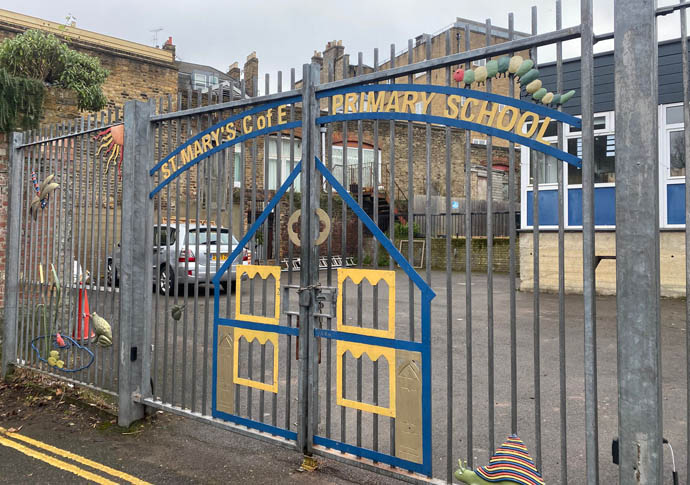Equality training at school after pupil’s trip ban
Boy who has autism and severe learning difficulties wasn’t allowed to visit museum
Friday, 17th January 2025 — By Isabel Loubser

St Mary’s Church of England Primary School
 WATCH OUR ONLINE POLITICS CHANNEL, PEEPS, ON YOUTUBE
WATCH OUR ONLINE POLITICS CHANNEL, PEEPS, ON YOUTUBE
A PRIMARY school has said all staff will complete equality training after accepting that their actions amounted to disability discrimination against a pupil.
A mother filed a claim against St Mary’s Church of England Primary School in Angel after her son, who has autism and severe learning difficulties, was banned from a school trip to the Science Museum.
Lana Yousify said she was told her six-year-old could not attend the school trip because of “safety concerns”, even if a parent came with him.
Her claim contends that the unfavourable treatment amounted to unlawful discrimination as it meant her son was treated differently because of his disability.
The school agreed to issue an apology letter to the family as part of a settlement. In a draft version seen by the Tribune, the chair of the governors wrote: “I, together with the headteacher and senior leadership team at the school, offer you our sincere apologies for the incident that occurred.
“On review of the processes at the time, it is regrettably the case that when [name redacted] was due to attend the school trip to the Science Museum, the school did not sufficiently consider putting in place reasonable adjustments and I offer our apologies for this oversight.”
Ms Yousify said that this was not the first time that she had felt let down by the SEND provision at the school.
“It was always challenging. It was always like they were putting obstacles in my way,” she said. “I had to quit my job after 15 years because St Mary’s kept calling me back.”
Ms Yousify’s experiences come as the number of SEND children in the borough continues to rise, with many parents feeling that schools aren’t well resourced or experienced enough to give them the attention and education that they need.
“I believe the council don’t fund the schools properly,” Ms Yousify said. “The schools don’t want to be in that position, but they can’t reject the child from the beginning. I do believe the schools should say from the start ‘we can’t support this child’s needs’.”
Shani Joseph-Mitchell, whose son has autism, said she had had similar experiences at two separate primary schools in the borough.
“Teachers don’t have the experience, the knowledge, or the willingness to cater for children with additional needs,” she said. “When you hear that other parents are also suffering, it makes you realise the need for greater scrutiny. We need to have a magnifying lens placed on these institutions. The borough can’t pretend that this isn’t happening.”
Ms Joseph-Mitchell withdrew her son from both schools, and is in the process of preparing a legal claim against the last for disability discrimination.
St Mary’s headteacher Anthony David said: “We pride our school on being a place of nurture, safety and aspiration and we do all that we can to ensure that every child gets the best possible experience during their time with us.
“There are occasions, however, where we have to make some very difficult decisions as educators. There are a huge number of factors we constantly have to consider and we always aim to do this with the best intentions.
“That is why it is important that we acknowledge not just where we would have done things differently, but also look at what we can learn and how we can improve. That is why we have apologised to the family concerned and are taking proactive steps to reflect and develop our practices even further.”
Councillor Michelline Safi Ngongo, executive member for children, young people and families, said: “Special educational needs and disabilities funding is provided by the national government, and local authorities are bound by legislation and the code of conduct. However, while demand for these services is rising rapidly nationally, funding has not kept pace with this growth.
“Despite these challenges, we remain committed to ensuring that children and young people receive the support they need equitably, and we are looking to work with government going forward to ensure legislation is amended and that crucial services get the funding they need.”